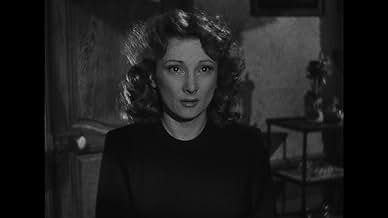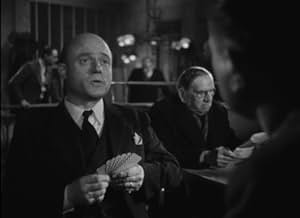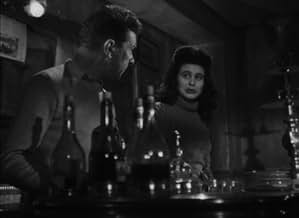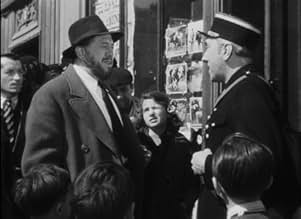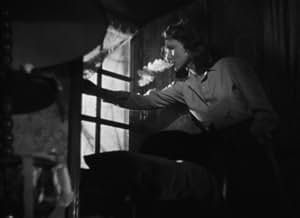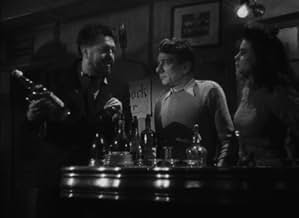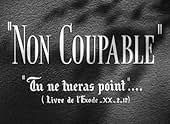Non coupable
- 1947
- Tous publics
- 1h 35m
IMDb RATING
7.6/10
332
YOUR RATING
An alcoholic doctor accidentally kills someone and manages to make the death look like an accident. The episode triggers a sense of confidence and he resolves to correct the miseries of his ... Read allAn alcoholic doctor accidentally kills someone and manages to make the death look like an accident. The episode triggers a sense of confidence and he resolves to correct the miseries of his life.An alcoholic doctor accidentally kills someone and manages to make the death look like an accident. The episode triggers a sense of confidence and he resolves to correct the miseries of his life.
Georges Bréhat
- Aubignac
- (as Georges Brehat)
Henri Charrett
- L'inspecteur Noël
- (as Charrett)
François Joux
- Le lieutenant Louvet
- (as Francois Joux)
Charles Vissières
- L'antiquaire
- (as Vissiere)
Emile Chopitel
- Tournier
- (as Chopitel)
Ariane Murator
- Madame Bastard, la mère de la petite malade
- (as Ariane Muratore)
Jean Sylvère
- Un ami du Docteur Ancelin
- (uncredited)
Featured reviews
Most people in the town, and all of its circle of important men, see Dr Ancelin as a failure like Charles Bovary: a hopeless, provincial drudge who works twice as hard to achieve half as much. But Ancelin has no Emma at his side (indeed, he terrifies his mistress Madeline, who is also cheating on him). He relies on alcohol and self-pity to get through the day as he sinks ever lower in the esteem of most of his neighbors, and perhaps himself. A fatal accident caused by the inebriated doctor provides the catalyst for the film's plot, in the course of which the good doctor tries to rehabilitate himself, at least in his own eyes, by a series of murders.
The view of life and human nature is about as bleak as it gets. Michel Simon embodies Ancelin's unpredictable violence and loathing, both for himself and just about everyone around him. His style of acting, looser and more uninhibited, contrasts with the classical style of the rest of the cast and makes the point even more forcefully.
Like Henri-Georges Clouzot, Henri Decoin directed films in France during the occupation (though, unlike Clouzot, he was not prohibited from directing after the war). Films like Clouzot's 'The Raven' ('Le corbeau') and Decoin's 'Non coupable' explore the realities of life under occupation decades before France would begin to deal with them publicly. Things that try to stay hidden have a terrible cost.
The view of life and human nature is about as bleak as it gets. Michel Simon embodies Ancelin's unpredictable violence and loathing, both for himself and just about everyone around him. His style of acting, looser and more uninhibited, contrasts with the classical style of the rest of the cast and makes the point even more forcefully.
Like Henri-Georges Clouzot, Henri Decoin directed films in France during the occupation (though, unlike Clouzot, he was not prohibited from directing after the war). Films like Clouzot's 'The Raven' ('Le corbeau') and Decoin's 'Non coupable' explore the realities of life under occupation decades before France would begin to deal with them publicly. Things that try to stay hidden have a terrible cost.
This must assuredly be the darkest of Henri Decoin's Film Noirs whilst its bleak and pessimistic tone is matched only by that of Duvivier's masterpiece 'Panique' from the same year.
Both films happen to star Michel Simon whose character in the earlier film is a tragic victim of circumstance whereas here he is the architect of his own downfall.
The screenplay by Marc-Gilbert Sauvajon is full of Gallic irony not least the film's title for although Simon's egomamiacal doctor longs to be found guilty of committing a series of seemingly perfect murders, his buffoonish exterior renders him above suspicion. He is a monstrous creature whose monstrosity is further enhanced by cameraman Jacques Lemare's low-angle shots. The final devastating dénouement represents the ultimate irony and is far more effective than the alternative upbeat ending that Decoin was obliged to shoot.
Excellent performances from Jean Wall as a rival doctor, the always-good-value Jean Debucourt as the investigating detective and Jany Holt as Simon's increasingly terrified mistress. As for Monsieur Simon one simply runs out of superlatives when describing this magnificent artiste whose portrayal here of a vainglorious but pitiable figure adds to his gallery of masterful characterisations.
Upon reading that a proposed remake to be directed by Christopher Gans and starring Albert Dupontel never came to fruition, this viewer could not help but heave a sigh of relief.
Both films happen to star Michel Simon whose character in the earlier film is a tragic victim of circumstance whereas here he is the architect of his own downfall.
The screenplay by Marc-Gilbert Sauvajon is full of Gallic irony not least the film's title for although Simon's egomamiacal doctor longs to be found guilty of committing a series of seemingly perfect murders, his buffoonish exterior renders him above suspicion. He is a monstrous creature whose monstrosity is further enhanced by cameraman Jacques Lemare's low-angle shots. The final devastating dénouement represents the ultimate irony and is far more effective than the alternative upbeat ending that Decoin was obliged to shoot.
Excellent performances from Jean Wall as a rival doctor, the always-good-value Jean Debucourt as the investigating detective and Jany Holt as Simon's increasingly terrified mistress. As for Monsieur Simon one simply runs out of superlatives when describing this magnificent artiste whose portrayal here of a vainglorious but pitiable figure adds to his gallery of masterful characterisations.
Upon reading that a proposed remake to be directed by Christopher Gans and starring Albert Dupontel never came to fruition, this viewer could not help but heave a sigh of relief.
"Non Coupable" is ahead of its time in tone and themes: I got both Claude Chabrol and Twilight Zone vibes from it. What begins as a dark thriller has evolved by the end into a profoundly (and amusingly) ironic black comedy; the ending is just about perfect. Very strong performance by Michel Simon in the lead. Avoid plot spoilers. *** out of 4.
The description of a small town, a doctor whose life is mediocre, committed an deadly accident and begins to think about the perfect crime. The balack and white helps us to feel this dark story.
A very brillant performance of Michel Simon, one of the greatest actors of the beginning of the last century.
A very brillant performance of Michel Simon, one of the greatest actors of the beginning of the last century.
Michel Simon is a drunk doctor with a declining practice. One evening, driving home from a dive bar, he strikes and kills a motorcyclist. Thinking fast and clearly, he makes it look like the motorcyclist had an accident. When he gets away with it, he congratulates himself on his brilliant thinking, and goes back to tending his patients with the best skill he has.
Then he discovers his mistress, Jany Holt, has been cheating on him and selling his gifts to her to give to her lover.
If you want someone to play a pitiable monster, you could not do better than Simon, and that's what director Henri Decoin has done here. He keeps his camera on Simon, surrounds him with intelligible and not particularly memorable characters -- with the exception of Jean Wall, who plays the doctor who is stealing away Simon's practice as a cold, arrogant character -- and lets Simon stand out, as he simultaneously exults in his triumphs and finds despair in the destruction of the ideals he once held.
Then he discovers his mistress, Jany Holt, has been cheating on him and selling his gifts to her to give to her lover.
If you want someone to play a pitiable monster, you could not do better than Simon, and that's what director Henri Decoin has done here. He keeps his camera on Simon, surrounds him with intelligible and not particularly memorable characters -- with the exception of Jean Wall, who plays the doctor who is stealing away Simon's practice as a cold, arrogant character -- and lets Simon stand out, as he simultaneously exults in his triumphs and finds despair in the destruction of the ideals he once held.
Did you know
- TriviaThe movie has an alternative ending, which is shown after the restored version of the film.
- GoofsThe crime takes place in a village of "Indre et Loire" (newspaper title). However, the big town around, twice quoted, is Chartres, i.e., in "Eure et Loire".
Details
- Runtime
- 1h 35m(95 min)
- Color
- Sound mix
- Aspect ratio
- 1.37 : 1
Contribute to this page
Suggest an edit or add missing content

